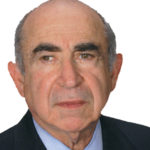2009 Honoree International DI Society
W. Harold Petersen Lifetime Achievement Award.
2015 Honoree of NAILBA’s
Douglas Mooers Award for Excellence.
From time to time we will feature an interview with Eugene, who has dedicated over 57 years of his life to learning, teaching, and supporting brokers in the agency’s quest to help consumers protect their incomes from the tragic effects of a disability. With the help of Victor Cohen, this is the eighth part of our ongoing series with Eugene Cohen, CEO and founder of the Eugene Cohen Insurance Agency, Inc.
Victor: I have often heard you say that one of the important responsibilities an advisor has is helping clients see the need for disability insurance.
Eugene: Yes, that’s right. And I have noticed that physicians, attorneys, and many professional people often immediately understand the need for disability insurance.
That’s not always the case with clients who may be salespeople, managers, executives, small business owners, electricians, carpenters, plumbers…the list is endless.
When the advisor brings up disability insurance to these clients, the clients often think, “Do I really need this?” Many times they will think about getting disability insurance but wait until it’s too late to buy.
Victor: So, what do you do to help clients see the need?
Eugene: To uncover the need, the advisor has to ask questions. I suggest asking the client, “Who depends on your income?” The answer will almost always be their spouse, their children, other family members, and themselves.
Another question to ask the client is, “What is your most valuable asset? Is it your car? Is it your home?”
When you buy a home and you obtain a mortgage, the lender is going to require you to have homeowner’s insurance, right? Let’s say that home is worth $300,000 or $400,000. The bank wants a guarantee that if the home is destroyed, the mortgage will be paid off. The bank considers that home a very valuable asset.
So, let’s look at a client’s income as an asset. Let’s say the client is 35 years old, earning $100,000 per year. Over the next 30 years, without salary increases, that future income is worth, at a minimum, $3,000,000. I would say that is the client’s most valuable asset—their ability to earn an income.
The client is like a money printing machine. If you had a money printing machine printing $100,000 per year, you would make sure that money machine was insured, right?
Victor: Absolutely. Just because someone is disabled and can’t work doesn’t mean their financial obligations go away.
Eugene: There are certain responsibilities that continue. In life, we have needs and we have wants. If income stops, needs continue.
Some of those needs include money to make mortgage payments, rent, utilities, health insurance, groceries…income takes care of these important non-cancellable obligations.
So how do we uncover the need for disability protection? By asking the client, “If you suffered a long-term disability, how would those needs be handled?”
I want to repeat, asking questions uncovers the need. Here’s another question to ask a client: “If you were disabled, how long would your savings last before it was depleted? How long would it take for your retirement dollars that you have put away to disappear?”
Your income is so valuable. It’s more valuable than the home you live in that the bank wants to make sure is insured for any catastrophe.
People have always said, “Good credit is extremely important.” Some people say it’s one of their most important assets. Can you imagine bills coming in and having no income to pay them? How would your credit be affected? Your credit rating could be destroyed.
Victor: There are also special disability products created just for small business owners.
Eugene: One of those products is disability Business Overhead Expense (BOE) insurance. When talking to a client who is a small business owner, with maybe ten to twelve employees, the advisor can ask, “If you were to have a disability that lasted one or two years, and you planned to come back to your business, how would your business expenses get paid while you were out-of-work disabled?”
The BOE policy would cover many qualifying business expenses during that time the small business owner was disabled.
Some examples of typical covered business expenses could include rent, utilities, phone bills, association dues, office supplies, equipment leases, some employees’ salaries (that qualify under the policy), etc. The purpose of this policy is to keep the business open if the owner desires to return.
Victor: Before we wrap up our conversation, can you talk a little about Disability Buy-Out insurance?
Eugene: Many advisors will fund a buy/sell agreement with life insurance. But what if one of the business owners is disabled and cannot work? A disability buy/sell agreement needs to be in place.
Disability Buy-Out (DBO) insurance helps provide the funds needed to buy a totally disabled business owner’s interest under a buy/sell agreement. With a DBO insurance policy in place, the remaining owner(s) may be able to continue the business without selling shares of the business for capital, without getting loans, without using business revenue.
Just a reminder, business owner eligibility for this type of product differs from company to company.
Victor: Thank you as always for sharing your depth of knowledge and passion protecting clients with disability insurance. Is there anything you’d like to add before we wrap up our conversation for now?
Eugene: It is the advisor’s job to bring up disability income protection when doing their reviews covering clients’ needs. Protecting assets is an extremely important part of the review. Income protection is asset protection. May everyone reading this have a happy and healthy New Year and an incredible 2022!





























